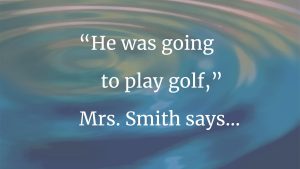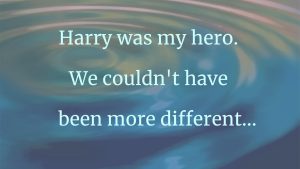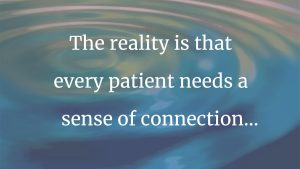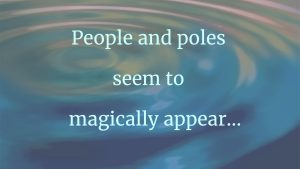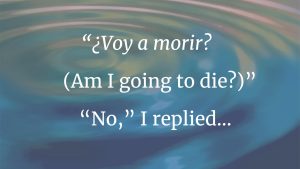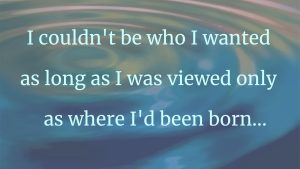Majid Khan
I pull up on the side of the road on this rainy British summer’s day. The rain doesn’t make it easy to get my doctor’s bag out of the trunk, which I do in a hurry so I can make my way to the house where I’ve been asked to visit a 37-year-old man named Kenneth.
This really isn’t ideal. Now my bag is wet, my papers are wet, my trousers are wet and my mood is wet. I didn’t want to do this visit anyway, but I’m still in my last year of training before becoming a full-fledged GP, and I’ve been given the task by one of the senior GPs in the practice.
“Cough/temperature” says the note the receptionist has scribbled. But while reviewing this patient’s records at the surgery I’d also spotted the words “demyelination” and “bed-bound”–words that had triggered my resistance to coming at all.
I knew this visit would upset me. Kenneth has an autoimmune disease like multiple sclerosis that is slowly destroying the sheaths covering his nerves. Kenneth is only nine years older than me.
The brown wooden door opens, and a plump, smiling lady wearing an apron welcomes me in, tells me her name is Charlie and leads me into Kenneth’s bedroom, announcing, “The doctor’s here.”
Kenneth lies in bed on his left side. His muscles, contracted by his disease, allow movement only at a heavy cost in pain. His caregiver, still smiling, returns from the hallway and bustles about him, giving him his medications.
“Easy…Doc…I…might…turn…around…and…smack…ya,” says Kenneth, his jovial spirit working its way through paralyzed muscles to reach my very pleasantly surprised ears.
In that moment, I remember my patient Mrs. Beal.
We’d met about two years ago, when I was still a junior doctor. She was a short, white-haired, smiling woman whose zest for life belied her years. Mrs. Beal was always in a good mood–even though she knew we could do nothing to help her. The specialists just didn’t know why her kidneys were failing, though they’d asked still other renal specialists for second, third and fourth opinions. All of Mrs. Beal’s test results were inconclusive.
I looked forward to seeing her on the ward rounds. She was in the first bed on the left–always smiling, even as she grew increasingly short of breath.
“What’s wrong with me, Doc?” she’d occasionally ask querulously. But soon she’d perk up, and we’d be laughing like old friends. As I sat on the end of her bed, she’d ask me about my childhood and why I had become a doctor. So trusting and close was our friendship that she felt comfortable asking, and I felt comfortable answering, questions even about my private dreams and passions. We had discussed things spiritual, mathematics and the enormous power of the mind. And then it was my turn to ask about her life. She adored her children–“Ohhh,” she would say, her head turning to the side as if she felt swept away by her devotion.
Powerlessness is perhaps the most powerful feeling a doctor faces. Without any choice in the matter, I’d been thrown into a warm, congenial relationship that I knew had to end. How unfair, I felt, that fate had thrown Mrs. Beal and me together–and how cruel that it would force us to part.
Though she and I never spoke of it, she seemed to know, in those last few days, that her life was heading in only one direction. But that didn’t get her down; she always had a smile.
Until the day when I turned up for morning rounds and saw that Mrs. Beal’s bed was empty.
They asked me to identify the body. I went to the hospital morgue.
There lay my friend. Death had finally made good on its promise–in spite of all our efforts, in spite of Mrs. Beal’s good character, in spite of our friendship and all I’d wanted for her.
As I stood there staring at her snowy hair, amid my grief and anger I felt a silent truth present itself: In the end, you see,death always wins.
“You’d…better…fix…me…before…I…go…to the…match…” says Kenneth, pulling me back into the present.
“I’ll certainly try, mate,” I answer.
Listening to his chest, I hear crackling sounds, and looking through Kenneth’s notes I see that this is one of many chest infections for which he’s been treated. I find myself wondering whether this will be his last.
I leave a prescription for antibiotics, with instructions to call again if there’s no improvement. I shake his stiff hand, bid him farewell and make my way towards the door.
“Are…you…gonna…be…there…Doc?”
“Where?” I say.
“The…match!” he exclaims, incredulous that I have already forgotten what he’s likely spent days being excited about.
“Come…on…you…Re…eds!” he says, cheering for his local Birmingham team through smiling, paralyzed lips. In spite of the fact that he can barely move, and that each move costs him heavily in pain; in spite of the fact that he has dreams but may never realize them.
Amid my admiration and sadness, a different, silent truth presents itself: In the end, life also wins.
I gather my bag, open the door and head out into the rain.
About the author:
Majid Khan is a general practitioner in Birmingham, UK. He works with substance abusers in prison and teaches communication skills at Warwick Medical School, where he is also in the process of setting up a course in mindful medical practice. Another of his stories has appeared in BJGP: The British Journal of General Practice. Other personal interests include Buddhism, spirituality and mathematics. He dedicates this story:
To my books, for teaching me much,
To my teachers, for teaching me much more,
To my patients, for teaching me everything.
Story editor:
Diane Guernsey

